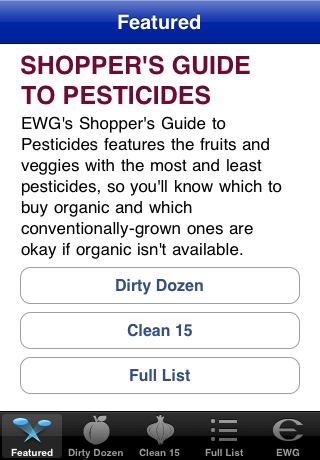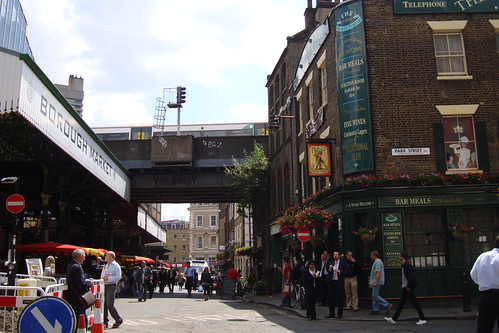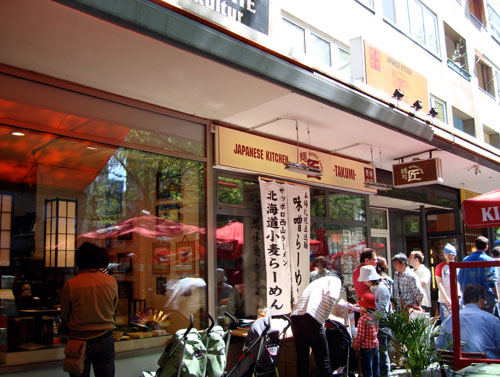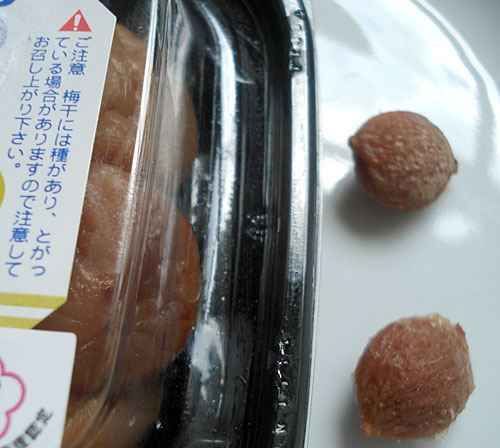3 years ago, I mentioned a handy list of produce ranked by how much pesticide is used to grow them. The higher (=more pesticides) the ranking, the better it would be to stick to organically grown.
I recently got a new iPhone (yes...I'm the very opposite of an Early Adopter of tech gadgets) and discovered that the same list is available as a free iPhone app called DirtyProduce. Here's a screenshot of the opening page:

It doesn't do much beyond list the Dirty Dozen (the most heavily pesticide-treated fruits and vegetables), the Clean 15 (the last pesticide-used) and the full list of 47 produce items, but it's handy to have around with you. Who knew for instance that peaches were the most pesticide-laden fruit or vegetable? I tend not to peel my peaches, and I ate, oh I don't know, a few tons of them over the summer. I may start peeling them next season, or look for non-treated ones.
Anyway, if you do have an iPhone, take a look. And if you don't, there is still the PDF list to print out and carry in your wallet.
Filed under:
fruit vegetables ethics shopping

When I found out that I'd be in London this week for a couple of days, my thoughts immediately turned to what food-related things I could fit into my schedule. Tea and scones, check. Curry, check. A visit to Japan Centre, check. But at the top of my list was a proper roam around Borough Market.
Long time readers of Just Hungry may know that I absolutely love markets, and go to them whenever and wherever I can. One big reason I've decided to move to the south of France is because of the wonderful markets here. So, how does London's oldest market compare to some of my favorites? While Borough Market is not the biggest market, nor does it have the widest selection, or even the best selection, of foodstuffs, it's a very special place. In my opinion, it's simply the most intellectually pleasing market there is.
Filed under:
food travel shopping uk london

I've long been intrigued by the famed Japantown or Japan Quarter area of Düsseldorf, Germany, but haven't had a chance to go there. It's about a 5 hour drive from Zürich, and there was no work-related excuse to go there - until last week that is. So, following up on my mostly Japanese frugal eats blitz through Paris, here is my 2-day all-Japanese blitz through Düsseldorf.
Filed under:
food travel japanese restaurants shopping ramen germany
(This item is only of interest if you live in Switzerland, specifically in the Zürich area. Everyone else, just move along.)
Filed under:
swiss shopping zurich british
I was just opening a new pack of umeboshi (pickled plums) today, when I noticed this warning on the lid in Japanese:
WARNING: Umeboshi have seeds, and sometimes the seeds can be pointed.
So please be careful.
Here's the label, with two pointy seeds.

(Edit: I could understand the umeboshi warning if it was in English (or language of the country in which the pack was being sold), since people may be unfamiliar with umeboshi. But this was a pack imported from Japan, with Japanese writing, so they are warning Japanese people, who are, or should be, familiar with umeboshi and their pointy seeds. Ume are related to apricots, so maybe apricots should have pointy-seed labels too.)
WTF? So...has it come to this now? We have to have warning labels on natural foods?
I can understand warning labels on manufactured products, say a pesto sauce, to warn about the existence of finely ground nuts. A small percentage of the population is very allergic to nuts.
But, surely the nut-allergic shopper knows to stay away from whole peanuts for example. Or will we have to have labels on those too? "Warning: This bag contains peanuts." ....
What about warning labels on bags of beans? "Warning: This bag contains beans, which may cause flatulence and socially awkward situations." Meat? "Warning: This pack contains meat, which comes from an animal. Vegetarians are known to have an aversion to meat." A bunch of bananas? "Warning: Bananas have slippery skins. If dropped on the ground, they may cause an accident, or a horde of circus clowns to show up."
Is this labelling gone too far? (Japan is not as litigious as the U.S. for example, but it's slowly getting there.) Are there any other nanny-state labels you've seen?
Filed under:
offbeat shopping